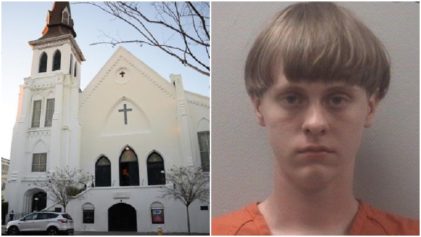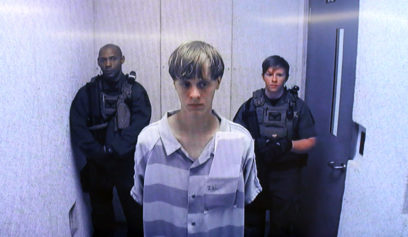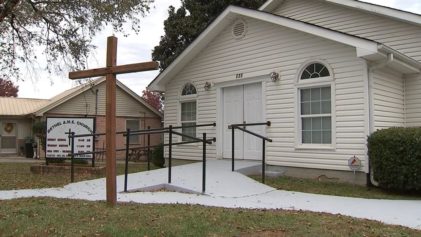The recent murder of nine Black people at Emanuel AME Church in Charleston, S.C. by a white supremacist has reignited the debate over hate crime laws, and whether or not they are effective.
Dylan Roof, 21, is charged with gunning down the Bible study group on June 17. The federal government is investigating the shooting as a hate crime, and it is expected that the U.S. Department of Justice will file federal hate crime charges against Roof. New York Magazine has reported that Roof has already been assigned two federal public defenders.
“This heartbreaking episode was undoubtedly designed to strike fear and terror into this community, and the department is looking at this crime from all angles, including as a hate crime and as an act of domestic terrorism,” read a statement from the Justice Department.
As reported by NPR, it is rare for the federal government to intervene with hate crime indictments, particularly if a jurisdiction already has a hate crimes statute on the books. Although 45 states have hate crimes laws, South Carolina is one of the five states without one. The other states include Arkansas, Georgia, Michigan and Wyoming. South Carolina State Rep. Wendell Gilliard, (D) whose district includes Emanuel AME, has cosponsored a bill introduced by Rep. J. Seth Whipper (D).
“Hate groups and hateful individuals see the inaction and are emboldened to come into our communities and commit horrific acts,” Gilliard told the Huffington Post. “Passing the law would be sending a message: We know you’re here; we’re prepared for you.”
Rep. Gilliard has been down this road before, unsuccessfully introducing hate crimes legislation in 2011 and 2013.
“I did that because I knew the history of the state. I always tell people, South Carolina is where many hate groups were born,” he said. “I felt that we needed to have a law intact to offset the buildup of these groups in the state of South Carolina. If we didn’t have laws in place to protect us, I feared something terrible could happen in our state.”
Rep. Whipper lamented that hate crimes bills have failed in the past because “a lot of the Republicans think that that’s just something for liberals.”
The efficacy of hate crimes legislation is up for debate. Civil rights groups and other proponents believe the heavier penalties allowed by such laws are a deterrent and send a strong message regarding hateful behavior, and could even encourage victims to report these crimes more frequently. Meanwhile, critics dismiss hate crimes legislation as symbolism, or merely used to cover up more systemic problems.
“We have no shortage of pretty severe penalties built into our law already,” said Senate Judiciary Committee chairman Larry Martin (R) to The State. “Anybody that commits murder has hate in their heart anyway. It doesn’t matter if it’s motivated out of color, if it’s motivated out of religion, if it’s motivated out of greed—it’s hate.”
What is certain, is the amount of hate group activity in the country. According to the Southern Poverty Law Center (SPLC) based in Montgomery, Ala., there are 784 known active hate groups in the United States, “including neo-Nazis, Klansmen, white nationalists, neo-Confederates, racist skinheads, Black separatists, border vigilantes and others.” Further, according to the SPLC Hate Map, there are 19 hate groups in South Carolina, including one racist skinhead group, two chapters of the Ku Klux Klan, three neo-Nazi, four white nationalist and six neo-Confederate organizations.
According to the FBI, there were 51 reported hate crimes in South Carolina in 2013, down from 148 the previous year. Nationwide, 5,928 hate crime incidents were reported that year, down from 7,783 in 2008. However, Politifact maintains that the data tends to be underreported, concluding that the estimate from the NAACP— that there are between 200,000 and 300,000 hate crimes in a given year— is more accurate.
Among the details that could militate in favor of a hate crimes charge for Roof is his alleged 2000-word online manifesto—which the FBI concluded he wrote “with a high degree of probability”— outlining his racial hostility and anxiety, and the influence of the Council of Conservative Citizens (CCC), a white nationalist group, on his beliefs.
“It’s the number one purveyor of propaganda about Black-on-white hate crimes in the United States,” said Heidi Beirich, a project director at the Southern Poverty Law Center, regarding the CCC.
Beirich noted in the Huffington Post that Roof reportedly wanted to “shoot Black people” before he opened fire, an example of words right out of the CCC playbook. The CCC, a resurrection of the White Citizens’ Councils of the 1950s and 1960s, which has enjoyed support from Republican Party politicians, has made campaign contributions to several GOP presidential candidates.
“We utterly condemn Roof’s despicable killings, but they do not detract in the slightest from the legitimacy of some of the positions he has expressed,” said the CCC in a written statement.
A 2009 report from the Department of Homeland Security sounded the alarm on hate group activity and predicted an increase in domestic terror attacks, with the election of the first Black president and the economic recession providing fertile ground for right-wing extremist groups.


